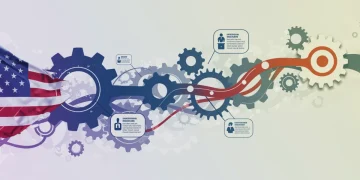The Future of credentialing: micro-certifications leading change

The future of credentialing involves the rise of micro-certifications and digital badges, which provide verified, flexible ways for individuals to showcase specific skills, making them increasingly valuable to employers.
The Future of Credentialing: Micro-Certifications and Digital Badges is reshaping how skills and knowledge are recognized. Have you ever wondered how these innovations affect your career opportunities? Let’s dive into this evolving landscape.
Understanding micro-certifications
Understanding micro-certifications involves exploring a new way to recognize skills and achievements in both education and the workplace. These digital credentials serve as proof of specific skills that a person has mastered.
Micro-certifications can enhance learning experiences, offering students a chance to gain recognition for their skills as they progress. They are often more affordable and accessible than traditional degrees, making education more flexible and tailored to individual career needs.
Benefits of micro-certifications
Micro-certifications come with a variety of advantages. Here are some key points:
- They provide a way to demonstrate skills to employers effectively.
- They can be earned quickly, allowing individuals to gain recognition without a long-term commitment.
- They offer a more affordable option compared to degree programs.
- They help learners stay current with industry trends and technologies.
In addition, micro-certifications are often linked with specific industries or roles, ensuring that the qualifications are relevant and applicable. This relevance helps job seekers stand out in a competitive market, as employers value practical knowledge.
The wide acceptance of micro-certifications in various industries indicates a shift in how organizations view traditional educational paths. As more companies adopt these credentials, the perception of their importance continues to grow.
Overall, understanding micro-certifications allows you to explore new learning pathways, gain valuable skills, and stay competitive in the job market. The future of education and credentialing is increasingly leaning towards these digital achievements.
The rise of digital badges
The rise of digital badges represents a significant evolution in how skills and achievements are recognized. Unlike traditional certifications, digital badges provide a visual representation of a specific skill set or accomplishment that can be shared online.
These badges are not just attractive icons; they contain metadata that outlines the issuer, criteria for earning the badge, and evidence of the individual’s skills. This transparency helps employers and peers understand the value of the credentials immediately. Because they are easily shareable, badges allow learners to showcase their achievements on platforms like LinkedIn or personal websites.
Benefits of digital badges
Digital badges offer a range of advantages that appeal to both learners and employers:
- They provide instant recognition of accomplishments.
- They can be accumulated over time, creating a clear visual of a learner’s journey.
- Employers can quickly assess a candidate’s qualifications.
- They encourage continuous learning and skill development.
The easy accessibility of digital badges aligns perfectly with today’s fast-paced and digital world. Professionals can earn these badges through various platforms, courses, and workshops, enhancing their learning experience while building a comprehensive portfolio.
Moreover, as more organizations adopt digital badges, they gain credibility and acceptance in many fields. Schools and training programs are beginning to incorporate these badges into their curricula, allowing students to collect and display their achievements as they learn. This trend signifies a shift toward recognizing skills acquired outside traditional educational settings, making it easier for non-traditional learners to gain recognition.
Benefits of micro-certifications in education

Understanding the benefits of micro-certifications in education is essential for students and educators alike. These credentials provide a modern approach to recognizing skills that students acquire outside of traditional coursework. As educational institutions adapt to evolving job markets, micro-certifications have become pivotal in enhancing a learner’s competitive edge.
One major benefit is that micro-certifications offer flexibility. Students can earn these credentials at their own pace, fitting learning into their busy schedules. By focusing on specific skills, they can quickly demonstrate expertise that is immediately relevant to potential employers.
Key advantages of micro-certifications
Micro-certifications enhance the educational experience in several ways:
- They allow for personalized learning paths tailored to individual career goals.
- They provide concrete proof of skills that employers are increasingly seeking.
- They encourage students to engage with practical, real-world applications.
- They can enhance resumes, making candidates more attractive to employers.
Moreover, these credentials help bridge the gap between education and the workforce. Educators can incorporate relevant micro-certifications into their curriculum, offering students tangible outcomes that reflect their learning journey. This not only motivates students but also equips them with vital skills as they prepare to enter the job market.
Lastly, micro-certifications promote a culture of lifelong learning. Students are encouraged to continually update and enhance their skill sets, ensuring they remain competitive in their respective fields. This emphasis on modern skills and ongoing development better aligns education with industry needs, creating more effective pathways for future success.
How employers view micro-certifications
Understanding how employers view micro-certifications is crucial for job seekers. As the job market evolves, employers are increasingly recognizing the value of these credentials. Micro-certifications are seen as a way for candidates to demonstrate their skills and knowledge in niche areas.
Employers appreciate the transparency that comes with micro-certifications. Each badge or certification provides specific information about what the individual has learned. This allows hiring managers to quickly assess whether a candidate possesses the relevant skills for a position.
Key perspectives of employers on micro-certifications
Here are some insights into how employers regard these credentials:
- Micro-certifications indicate a proactive approach to learning and professional development.
- They help in gauging a candidate’s specialized skills that may not be covered by traditional degrees.
- Employers value the practical skills that candidates can bring to the workplace, as demonstrated by these certifications.
- They reflect a commitment to staying current with industry trends and technologies.
Furthermore, many employers view micro-certifications as a way to reduce the skills gap. They understand that traditional education may not always provide the specific skills needed in fast-changing industries. As a result, they are more likely to consider candidates who hold relevant micro-certifications.
Another major aspect is the potential for streamlined hiring processes. Micro-certifications can speed up candidate evaluations, allowing hiring managers to identify qualified individuals more quickly. This efficiency benefits both the employer and the job seeker, facilitating a smoother recruitment process.
Future trends in credentialing
Exploring future trends in credentialing helps us understand how the landscape of education and skills recognition is evolving. As technology continues to advance, the way we evaluate and prove our skills is changing significantly. This shift is influenced by the need for more flexible and relevant forms of assessment in today’s job market.
One emerging trend is the integration of blockchain technology into credentialing systems. Blockchain can provide a secure and verifiable way to store credentials, making it easier for employers to verify a candidate’s qualifications. This technology enhances trust and transparency in the credentialing process.
Key trends shaping the future of credentialing
Several important trends are defining the future of how credentials are earned and recognized:
- The rise of competency-based education allows learners to progress as they demonstrate mastery of skills.
- Increased use of online learning platforms that offer micro-certifications and digital badges.
- Employers are focusing more on skills assessments rather than traditional degrees.
- The adoption of personalized learning paths tailored to individual career goals.
Another trend is the focus on lifelong learning. As industries evolve, professionals will need to continuously update their skills. This shift towards ongoing education means that credentialing will become more dynamic and responsive to the needs of the workforce.
Finally, as diversity and inclusion continue to be key priorities in hiring practices, credentialing systems will also be evaluated through this lens. Companies will look for ways to ensure that their credentialing processes are accessible and equitable, helping to broaden the talent pool.
FAQ – Frequently Asked Questions about Micro-Certifications and Digital Badges
What are micro-certifications?
Micro-certifications are short, focused credentials that validate specific skills or knowledge gained through training or education.
How do digital badges work?
Digital badges are visual representations of micro-certifications that can be shared online, showing that an individual has achieved certain competencies.
Why are employers interested in micro-certifications?
Employers value micro-certifications because they demonstrate a candidate’s specific skills and their commitment to continuous learning.
What future trends are influencing credentialing?
Trends include the rise of blockchain for secure credentialing, increased focus on skills assessments, and the growing importance of lifelong learning.






